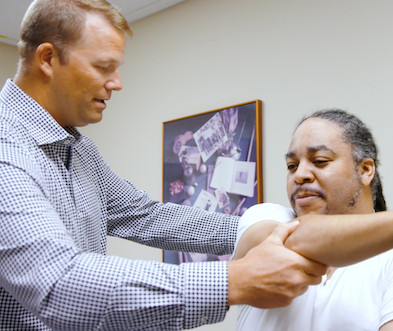
Physiatry, also referred to as physical medicine and rehabilitation, is a specialized field that helps patients overcome pain, improve function, and enhance their quality of life. Despite being a relatively newer specialty, physiatry has helped countless people improve their lives.
Physiatrists work in various settings, including outpatient clinics, hospitals, rehabilitation centers, and long-term care facilities. These specialists treat a wide range of medical conditions that affect the musculoskeletal system and nervous system.
Kansas City Orthopedic Alliance is the largest orthopedic practice in the metro. With a team of over 50 providers, we have orthopedic surgeons, sports medicine doctors, advanced practice providers, and physiatrists in Kansas City. Together, we treat thousands of patients each year across our 5 locations—Overland Park, Leawood, Belton, Kansas City, and Blue Springs.

Our physiatrists use the latest technology to evaluate, diagnose, and treat injuries and conditions. In this blog, our physiatrists in Kansas City share more about the field, what it means to be a physiatrist, how to choose the right physiatrist for your needs, and more.
Understanding Physiatrists
First, let’s talk about the role of a physiatrist and what makes them different from other medical specialties.
What Physiatrists Treat
Physiatrists work to diagnose, prevent, and treat all types of disabilities related to the muscles, bones, nerves, and brain. Some of the most common conditions physiatrists treat include:
- Musculoskeletal pain
- Sports-related injuries
- Spinal cord injuries
- Traumatic brain injuries
- Arthritis
- Neuromuscular disorders
Goals of Treatment
The goals of physiatry are to maximize function, reduce or eliminate pain, foster independence, and improve a patient’s quality of life without surgery.
Types of Treatments
Physiatrists can employ several treatments and techniques to treat your injury/condition, including:
Medications
Physiatrists are known for taking a holistic approach to patient care, prioritizing function and rehabilitation over solely relying on medications. However, medication can still be an important part of a physiatrist’s larger treatment plan.
Our physiatrists in Kansas City may include the following types of medications in their treatment plan:
- Nonsteroidal anti-inflammatory drugs (NSAIDS) to reduce inflammation and pain
- Muscle relaxants to alleviate muscle spasms or stiffness
- Corticosteroids to reduce inflammation and pain
- Topical analgesics to relieve pain
Rehabilitative Therapies
As doctors who specialize in rehabilitation, therapy is often an important part of a physiatrist’s treatment plan. This can include:
- Physical therapy to improve strength, flexibility, balance, and mobility
- Occupational therapy to improve fine motor skills, coordination, and activities of daily living
- Speech-language therapy to improve communication skills and swallowing abilities
Interventional Procedures
Our interventional physiatrists in Kansas City offer many minimally invasive procedures to alleviate pain and improve function, including:
- Radiofrequency ablation
- Spinal cord stimulation
- mild® Procedure
- Verteflex Superion
- Sonex
- Ultrasound-guided injections
- Tenex
- Orthobiologic injections
Education & Training
Physiatrists undergo rigorous and specialized training to earn their credentials. Physiatrists must complete:
- A four-year bachelor’s degree
- Medical school
- A 4-year residency training in physical medicine and rehabilitation
- Licensing exams and board certification through the American Board of Physical Medicine and Rehabilitation (ABPMR)
Additionally, some physiatrists choose to complete an optional fellowship to further specialize in an area of PM&R. These fellowships give physicians further training and experience in a subspecialty, such as:
- Sports medicine
- Spinal cord injury
- Pediatric rehabilitation
- Brain injury medicine
- Pain medicine
Myths & Misconceptions About Physiatrists
As a relatively newer field, physiatry doesn’t always have the same recognition as more traditional medical specialties.

This can lead to some misconceptions and myths about the field. Our physiatrists in Kansas City are here to set the record straight!
Myth #1: Physiatrists Are the Same as Physical Therapists
Physiatrists and physical therapists often work collaboratively, but they have very different roles and responsibilities.
Physiatrists are medical doctors who have undergone medical school and have extensive training in physical medicine and rehabilitation. Physiatrists design comprehensive treatment plans that include interventions and therapies to restore function and improve quality of life.
Physical therapists, on the other hand, are healthcare professionals who work collaboratively with physiatrists. Physical therapists take the treatment plan the physiatrist has created and execute the plan laid out by the physician.
Physiatrists and physical therapists both have important roles in the rehabilitation process, but the two roles are not interchangeable.
Myth #2: Physiatrists Only See Elderly Patients
Physiatrists play an important role in the rehabilitation needs of older adults; however, they do not exclusively provide care to this demographic. Physiatrists care for all age groups—from children with developmental disorders to teenagers with sports injuries and middle-aged adults with musculoskeletal issues. Physiatrists provide care for patients across the lifespan.
Myth #3: Physiatrists Only Work in Rehabilitation Centers
Physiatrists are often the primary physicians working in rehabilitation centers. However, there are many other settings where physiatrists work, including:
Outpatient Clinics
At Kansas City Orthopedic Alliance, our physiatrists work in an outpatient setting. These non-surgical musculoskeletal specialists provide:
- Assessments, physical examinations, interpretation of diagnostic tests, and a diagnosis
- Treatment plans based on the specific needs, conditions, and functional goals of the patient
- Coordination of rehabilitation and therapy, working with therapists to monitor progress and make adjustments to the treatment plan
- Pain management through interventional procedures
- Education and guidance on preventive measures and lifestyle modifications
- Follow-up appointments and progress monitoring
Hospitals
Physiatrists are often employed by hospitals to manage rehabilitative care. Physiatrists in the hospital setting may have the following roles and responsibilities:
- Provide consultations for patients in acute care
- Asses functional limitations of patients
- Oversee inpatient rehabilitation units
- Manage rehabilitation programs
- Employ interventional procedures, physical modalities, and therapies for pain management
- Patient education about the rehabilitation process and realistic expectations for discharge
Other Settings
There are many other settings where physiatrists can work, including:
- Sports medicine clinics
- Long-term care facilities
- Skilled nursing facilities
- Pediatric clinics and hospitals
Myth #4: You Should Only Go to a Physiatrist if You Have a Severe Injury or Disability
Physiatrists are not only for patients with extreme injuries or disabilities. Pain of any severity can have an impact on your day-to-day life. Addressing a concern early before it becomes worse can make treatment and recovery that much easier. Anyone facing physical limitations, experiencing functional impairments, or seeking rehabilitation can benefit from seeing a physiatrist.

Physiatrists are here to help improve your symptoms—whether they are mild or severe. If you need someone to treat an acute injury, manage your chronic pain, or assist in your recovery from surgery, physiatrists can provide the specialized care that’s needed to improve your functionality and overall well-being.
What to Look For in a Physiatrist
Finding the right healthcare provider (of any specialty) can be a difficult task. To find a qualified physiatrist to address your needs, it’s important to:
1. Ensure They Have Proper Credentials
Physiatrists need to complete medical school and residency training in physical medicine and rehabilitation. Physiatrists should be board-certified by the American Board of Physical Medicine and Rehabilitation.
2. Look At Their Experience and Specialization
When choosing a provider, you’ll want to look at their experience and how it aligns with your needs. If you have a complex condition, you may want to find a physiatrist who has completed a fellowship program or specializes in that area of care.
3. Read Reviews
Reading reviews from former patients can help you determine the best physiatrist for your needs. Look at reviews that mention specific physiatrists and the practice as a whole.
If you want to learn more about the patient experience at KCOA, read what our patients have to say about our physiatrists in Kansas City!
“Dr. Moore & staff are fantastic. The whole process was the smoothest that I have experienced in healthcare in 20 years. I’m grateful that she took time to listen to me, and help provide ideas for treatment. Great people to work with.” -Sterling C.
“Doctor Kadavi: Empathetic, caring, supportive, and even funny at times; which helps reduce the duress. Front staff is amazing. Curious, helpful, patient, and supportive. Dr. Moore is amazing. Good listener, empathetic, genuine, collaborative, and caring. Listens to my story collaborates with me since I am the expert on my pain…” -Kris K.
“Dr. Fotopolous is one of the greatest doctors I have been to. He always identifies where my pain is coming from and manages to inject me in exactly the right place. I am forever grateful for his excellent service.” -Terri B.
“Dr. Santos was a rockstar very professional patient listener, very thorough. He broke down the material on explaining options and I accomplished needed care needs. This is second time that I’ve had to go to him in 3 years and highly recommend him.”
Visit Kansas City Orthopedic Alliance for Physiatrists in Kansas City
At Kansas City Orthopedic Alliance, we’re dedicated to creating a superior patient experience for all. If you’re wondering what to do about pain, KCOA has experienced physiatrists to enhance your well-being.
We’ve helped thousands of patients treat their pain, restore their function, and improve their quality of life. For a thorough evaluation, call us at (913) 319-7600 or schedule an appointment today. If you’re struggling with pain but don’t know where to start, use our symptom tracker for treatment recommendations.


